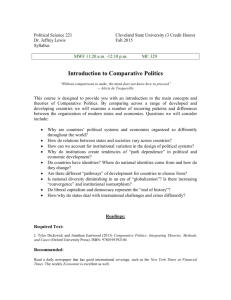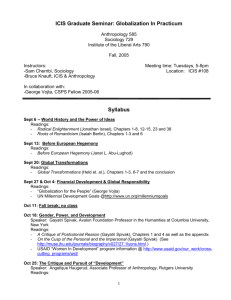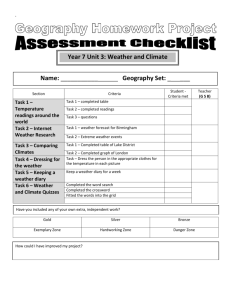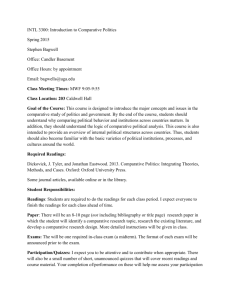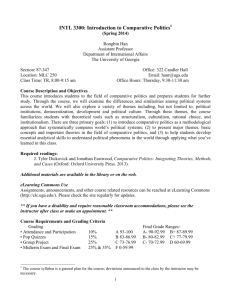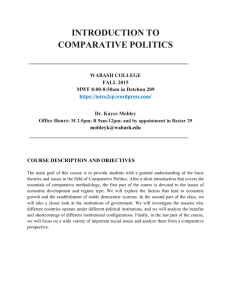Fall 2013 - Department of International Affairs
advertisement
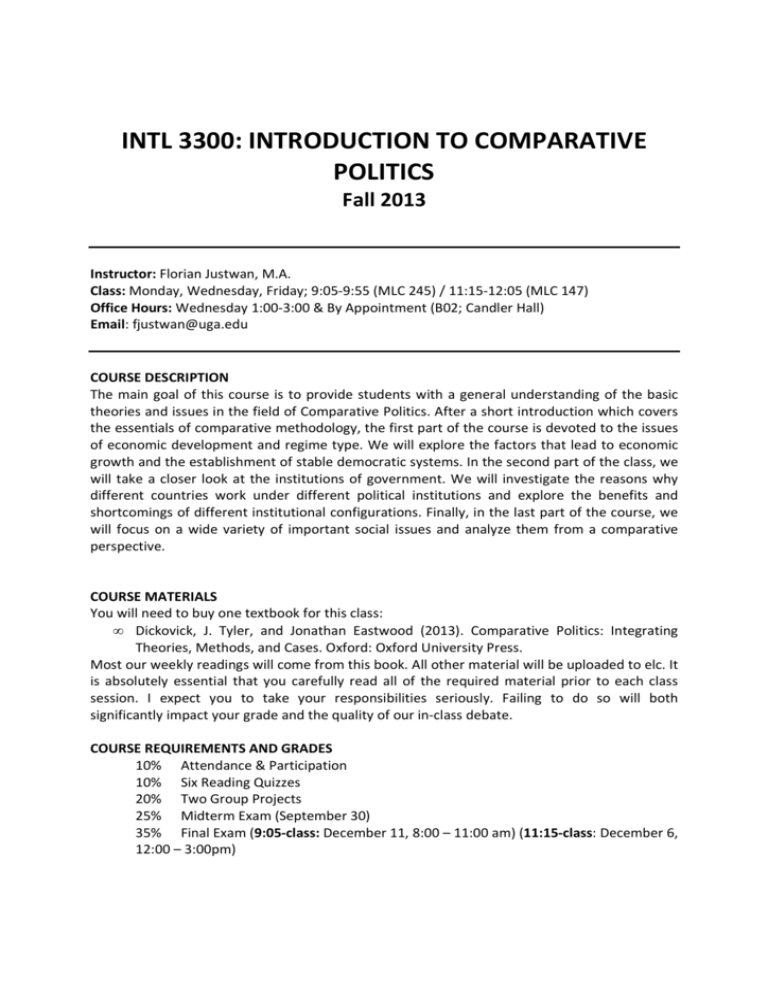
INTL 3300: INTRODUCTION TO COMPARATIVE POLITICS Fall 2013 Instructor: Florian Justwan, M.A. Class: Monday, Wednesday, Friday; 9:05-9:55 (MLC 245) / 11:15-12:05 (MLC 147) Office Hours: Wednesday 1:00-3:00 & By Appointment (B02; Candler Hall) Email: fjustwan@uga.edu COURSE DESCRIPTION The main goal of this course is to provide students with a general understanding of the basic theories and issues in the field of Comparative Politics. After a short introduction which covers the essentials of comparative methodology, the first part of the course is devoted to the issues of economic development and regime type. We will explore the factors that lead to economic growth and the establishment of stable democratic systems. In the second part of the class, we will take a closer look at the institutions of government. We will investigate the reasons why different countries work under different political institutions and explore the benefits and shortcomings of different institutional configurations. Finally, in the last part of the course, we will focus on a wide variety of important social issues and analyze them from a comparative perspective. COURSE MATERIALS You will need to buy one textbook for this class: • Dickovick, J. Tyler, and Jonathan Eastwood (2013). Comparative Politics: Integrating Theories, Methods, and Cases. Oxford: Oxford University Press. Most our weekly readings will come from this book. All other material will be uploaded to elc. It is absolutely essential that you carefully read all of the required material prior to each class session. I expect you to take your responsibilities seriously. Failing to do so will both significantly impact your grade and the quality of our in-class debate. COURSE REQUIREMENTS AND GRADES 10% Attendance & Participation 10% Six Reading Quizzes 20% Two Group Projects 25% Midterm Exam (September 30) 35% Final Exam (9:05-class: December 11, 8:00 – 11:00 am) (11:15-class: December 6, 12:00 – 3:00pm) Attendance Each unexcused absence will lower your final participation grade (calculated on a scale from 0 – 100) by 5 percent. I will take attendance every day. Therefore, it is essential that you show up on time. If you do come in late, it is your responsibility to approach me directly after class (as long as I am still in the classroom) and make sure that I checked your name on the class roll. Participation (10 percent) Your participation grade will be based on the quality and quantity of your oral contributions during class. As stated above, I expect you to read and think about the assigned material prior to our meetings. In class, you should be able to discuss the main arguments and demonstrate that you are able to connect the readings with the larger context. Please note that your participation grade is only affected by active participation. If you don’t talk, your final participation grade will be a 60 (minus 5 x number of unexcused absences). If you have any concerns about your participation grade, contact me as soon as possible. Reading Quizzes (10 percent) There will be 6 unannounced readings quizzes over the course of the term. The quizzes will be composed of multiple choice and/or short answers that cover the assigned readings for each day. Reading quizzes will NOT be made-up if you are absent. However, only five of those six quizzes will be used to calculate your grade. In other words, I will drop your lowest score at the end of the semester. Exams There are 2 exams in this class – 1 midterm (25 percent) and 1 final exam (35 percent). Exam material will be drawn from the following: lecture notes, assigned required readings, class discussion, movies shown in class, and any other supplementary materials. All exams are cumulative. One piece of advice: Do the required readings, attend class, and participate and you will be very well prepared for both exams. Two Group Projects (20 percent) Over the course of the entire term, you will be working on two different group projects. Both of them will count towards 10 percent of your final grade. These projects will give you the possibility to (1) apply the knowledge acquired in this course, (2) learn new aspects about a country of your choice, and (3) have fun interacting with your fellow class-mates. Project 1 is a 12-15 minute in-class presentation in which you (together with 3 fellow students) present the most important aspects of your assigned country. Your presentation should cover the country’s history (keep it brief!), its political institutions, political culture and the topic on the syllabus for each day. At the end of each presentation (which will be given every week on Friday), you need to provide some kind of interactive component for the class! Project 2: At the end of the term (Week 15), we will conduct a small in-class simulation of a Constitutional Convention. Every student will act as representative of a societal group in an assigned country. The goal is to forge a constitution for this newly (re)created state. As part of your preparation, you will be required to compose a short 2-page strategy paper (single-spaced!) that outlines the positions that you are going to take during the in-class simulation. At the beginning of week 13, I will announce more details about this simulation. GRADE SCALE Note: final grades will NOT be rounded A AB+ B BC+ C CD F = 93.00-100.00 = 90.00-92.99 = 87.00-89.99 = 83.00-86.99 = 80.00-82.99 = 77.00-79.99 = 73.00-76.99 = 70.00-72.99 = 60.00-69.99 = 00.00-59.99 COURSE POLICIES Absences & Make-Up Exams As stated above, attendance is absolutely essential if you want to succeed in this class. You are permitted ONE unexcused absence. Every other absence will lower your participation grade by 5 percent, unless you have a valid excuse (medical, academic, etc.) AND proper documentation. Make-up exams are ONLY offered for documented absences. If you know in advance that you have a conflict preventing you from taking one of the exams at the scheduled date, please contact me as soon as possible. Academic Honesty All students are responsible for maintaining the highest standards of honesty and integrity in every phase of their academic careers. The penalties for academic dishonesty are severe, and ignorance of the academic honesty policy is not an acceptable defense. Each student must meet the standards included in “A Culture of Honesty,” (http://www.uga.edu/honesty/ahpd/ACOH%20May%20%2707.pdf) I will report all instances of academic dishonesty to the Vice President for Instruction, whose office processes such matters. Disabilities Students who need note-takers or are supposed to take their tests at Disability Services should let me know as soon as possible so we can make accommodations for you. Classroom Etiquette The use of cell phones, iPods, iPads, or any other electronic devise will not be permitted during class meetings. I will permit you a laptop ONLY to take notes and review online readings. Please note that I reserve the right to reverse this policy at any time Grade Appeals If you believe your exams or assignments have been graded unfairly, you can appeal your grade in written form. You have to hand in your appeal on the day after the assignment or exam was returned. Comparisons to other students’ graded assignments will not be accepted for a complaint. Hand in the original copy of the graded assignment/exam together with the written appeal. I will reevaluate your grade in light of the argument that you made. However, the new grade may be the same, higher, or lower than the original grade and it will be final. COURSE SCHEDULE (This is only a tentative schedule for this course. Content may change) PART I: Introduction Week 1 Introduction and the Comparative Method August 12 (M) This Syllabus August 14 (W) Dickovick and Eastwood Chapter 1 August 16 (F) Week 2 Dickovick and Eastwood Chapter 2 The State August 19 (M) Dickovick and Eastwood Chapter 3 August 21 (W) A. Alesina et al. (2001). “Why Doesn’t The US Have A European-Style Welfare State?” Harvard Institute of Economic Research. Discussion Paper Number 1933. August 23 (F) No Readings. PART II: Development and Democracy Week 3 Economic Development August 26 (M) J. Diamond (2005). “The Shape of Africa.” National Geographic 208 (3), pp. 25-30. Available at: http://ngm.nationalgeographic.com/ngm/0509/resources_geo2.html August 28 (W) F. Fukuyama (1995). “A Loose Tray of Sand (Chapter 8).” In: Trust: social virtues and the creation of prosperity. Free Press, New York, pp. 69-82. August 30 (F) Week 4 D. Acemoglu and J.A. Robinson (2012). Why Nations Fail. Crown Publishers, New York. Chapter 3. Sept. 2 (M) Democracy and Democratization I LABOR DAY Sept. 4 (W) Dickovick and Eastwood Chapter 5. Sept. 6 (F) R. Inglehart and C. Welzel (2009). “Modernization, Cultural Change and Democracy.” In: L. Mayer, D. Patterson, and F. Thames (eds). Contending Perspectives in Comparative Politics. CQ Press, Washington, pp. 485-514. Week 5 Sept 9. (M) Democracy and Democratization II Dickovick and Eastwood Chapter 6. Sept 11. (W) F. Zakaria (1997). “The Rise of Illiberal Democracy.” In: Foreign Affairs 76 (6), pp. 22-43. Sept. 13 (F) No readings. PART III: Institutions of Government Week 6 Sept. 16 (M) Constitutions and Constitutional Design Dickovick and Eastwood Chapter 7. Sept. 18 (W) A. Stepan (1999). “Federalism and Democracy: Beyond the U.S. Model.” In: Journal of Democracy 10 (4), pp. 19-34. Sept. 20 (F) No readings. Sept. 23 (M) Legislatures & Legislative Elections Dickovick and Eastwood Chapter 8. Week 7 Sept. 25 (W) - E. Liu (2012). “Should Voting be Mandatory?” In: Time Magazine Online. (elc) - D. Matthews (2012). “What if it were illegal NOT to vote?” In: Washington Post Online. (elc) Sept. 27 (F) Finish Discussion about Legislatures and EXAM REVIEW Sept. 30 (M) Midterm Exam & Movie Week MIDTERM EXAM Week 8 October 2 (W) Movie pt. 1 October 4 (F) Week 9 Movie pt. 2 (we might need an additional 5-10 minutes to finish the movie). Executives October 7 (M) Dickovick and Eastwood Chapter 9. October 9 (W) - J. Linz (1990). “The Perils of Presidentialism.” In: Journal of Democracy 1 (1), pp. 51-69. - D. Horowitz (1990). “Comparing Democratic Systems.” In: Journal of Democracy 1 (1), pp. 73-79. October (F) 11 No Readings. PART IV: Politics, Societies, and Culture Week 10 Revolutions & Contention October (M) 14 Dickovick and Eastwood Chapter 11. October (W) 16 W. Rees & R. Aldrich (2005). “Contending cultures of counterterrorism: transatlantic divergence or convergence?” In: International Affairs 85 (5), pp. 905-923. October (F) 18 No Readings. Week 11 Nationalism & National Identity October (M) 21 Dickovick and Eastwood Chapter 12. October (W) 23 S. P. Huntington (2004). Who are We? The challenges to America's identity. New York, Simon & Schuster. Chapter 1 October (F) 25 No Readings. Week 12 Race, Ethnicity & Gender October (M) 28 Dickovick and Eastwood Chapter 13. October (W) 30 S. Bush (2011). “International Politics and the Spread of Quotas for Women in Legislatures.” In: International Organization 65 (1), pp. 103-117 only! Nov. 1 (F) Week 13 FALL BREAK! Ideology & Religion Nov. 4 (M) Background Material for in-class simulation. Nov. 6 (W) Dickovick and Eastwood Chapter 14. Nov. 8 (F) No Readings. Week 14 Environmental Issues Nov. 11 (M) - J. Diamond (2005). “Collapse: how societies choose to fail or succeed.” Penguin, New York. Chapter 2 (Twilight at Easter). - J. Diamond (2005). “Collapse: how societies choose to fail or succeed.” Penguin, New York. Chapter 12 (China, Lurching Giant). Nov. 13 (W) J. Kurtzman (2009). “The Low Carbon Diet.” In: Foreign Affairs 88(5) pp. 114-122. Nov. 15 (F) No readings. Prepare for in-class simulation. Week 15 In-Class Simulation: Constitutional Designs Nov. 18 (M) In-Class Simulation 1 Nov. 20 (W) In-Class Simulation 2 Nov. 22 (F) Finish Simulation and Discussion Week 16 Thanksgiving Break Nov. 25 (M) Nov. 27 (W) Nov. 29 (F) Week 17 no class no class no class Preparation for Final Exam Dec. 2 (M) Review for Final Exam Dec. 3 (Friday no class schedule!) Dec. 4 (W) Reading Day Week 18 Dec. 6 (F) 11:15-class: 12:00 – 3:00pm Dec. 11 (W) 9:05-class: 8:00 – 11:00 am
